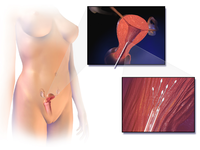
Photo from wikipedia
Infertility is a debilitating situation that millions of women around the world suffer from, but the causal relationship between infertility and endometriosis is still unclear. We hypothesize that the immune… Click to show full abstract
Infertility is a debilitating situation that millions of women around the world suffer from, but the causal relationship between infertility and endometriosis is still unclear. We hypothesize that the immune cell populations of uterine natural killer cells (uNK) and plasma cells (PC) which define chronic endometritis could differ in patients with or without endometriosis and therefore be the link to endometriosis-associated infertility. Our retrospective study includes 173 patients that underwent an endometrial scratching in the secretory phase of the menstrual cycle and subsequently immunohistochemical examination for uNK cells and PC. Sixty-seven patients were diagnosed with endometriosis, 106 served as the control cohort. The risk for an elevated number of uNK cells in women with endometriosis is not increased as compared to the control group. Our findings suggest that patients with endometriosis are 1.3 times more likely to have chronic endometritis (CE) as compared to those without and that the treatment with doxycycline might increase pregnancy rates. Endometriosis and an increased number of uNK cells seem to be unrelated. In contrast to the lately published connection between endometriosis, infertility and increased uNK cells, we could not find any evidence that patients with endometriosis are more prone to elevated uterine uNK cells. Counting of PC in endometrial biopsies might be a new approach in the search of biomarkers for the nonsurgical diagnosis of endometriosis since our findings suggest a connection.
Journal Title: Archives of Gynecology and Obstetrics
Year Published: 2020
Link to full text (if available)
Share on Social Media: Sign Up to like & get
recommendations!